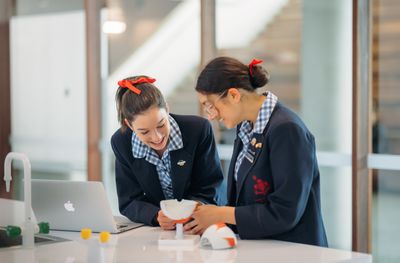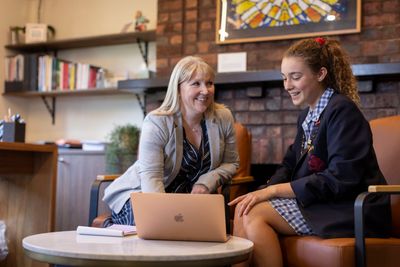Advice for students taking their first career steps
What will the workplace look like when our Junior School students turn 18 in 2030? Will university still exist? Will robots be doing our work? The short answer is - we don’t really know. What we do know is our students are planning their careers in a tumultuous landscape, unseen by previous generations, thanks to advances in technology and globalisation.
Our grandparents prioritised job stability and prestige when deciding upon a career. To “like” your job was a bonus and came second to having a “job for life”. Subsequent generations discovered that liking your job actually improved career satisfaction and productivity, and the career advice changed to “seek what you are most passionate about”, but also, “choose a passion that makes money”. In contemporary society, the focus on passion creates a new challenge for students. What if they have not discovered a passion yet? Do they have more than one? This makes it tough to decide which path to take.
This focus on passion is made more complex by 50,000 Australian undergraduate tertiary options currently in existence.
Students are overwhelmed by choice and the expectation to “get it right”. For students about to embark on their first career steps in this current environment, it is important to ease the pressure and expectation of choosing the path you believe is right and will do forever. In today’s climate, we can have many different careers so this is an extinct notion.

The landscape of universities is rapidly changing to meet the demand of growing STEM industries that harness creativity, innovation and communication. You would ideally like to look for an institution that has strong partnerships with industry, promotes flexible delivery, capstone projects, work integrated learning and credit for volunteer work. This is important for employability as it continues to develop those skills, which prospective employers will want to know about.
If you are considering university, take advantage of Early University Entry. This supports school/university transition and decreases the reliance on ATAR, making for a less stressful VCE.
Successful early entry applicants can successfully demonstrate the skills in leadership, teamwork, entrepreneurship and innovation. Choose a degree that relates to the problems you wish to solve in the world rather than focus on the job titles, which are rapidly shifting.
As technology becomes more fine-tuned, there are now incredible alternatives to university. Companies such as Google, Microsoft, Amazon and PWC all offer apprenticeship programs to fast track a career without a university degree. Further, with Digital Entrepreneurship (the fastest growing career), students have the tools and capability to create their own enterprises that previous generations never had.

During a career, one always experiences varying levels of certainty. The number one piece of advice I give to students is to maintain a strong sense of “positive uncertainty”, a trust that no matter how unpredictable the labour market is, they have everything it takes to continue to make effective career decisions.
CONSIDER
Ease pressure and expectation by considering that you are deciding what you are going to do next, not what you are going to do “forever”.
MAKE YOURSELF VALUABLE
Skills such as communication, creativity, and problem solving (more than knowledge) are valuable both at school AND after school. Skill development occurs in contexts, such as clubs, sport, music, creative arts, community service and casual employment.
START EARLY
Take advantage of Early University Entry -this supports school/university transition and decreases the reliance on ATAR, making for a less stressful VCE. Successful early entry applicants can successfully demonstrate the skills mentioned above - as well as leadership, teamwork, entrepreneurship and innovation.
PARTNERSHIPS
University is changing - and its relevance is being tested! Look for an institution that has strong partnerships with industry, promotes flexible delivery, capstone projects, work integrated learning and credit for volunteer work. This is important for employability as it continues to develop those skills which prospective employers will want to know about.
AMAZING ALTERNATIVES
Amazing alternatives to university exist, particularly in Technology. Companies such as Google, Microsoft, Amazon and PWC all offer “apprenticeship” programs to fast track a career without a university degree. Further, with Digital Entrepreneurship the fastest growing career, students have the tools and capability to create their own enterprises that previous generations never had.
For more information on the Toorak College Student Futures program please visit our Senior School page or contact our Student Futures Specialist, Coco Callanan, at cococ@toorakc.vic.edu.au.
